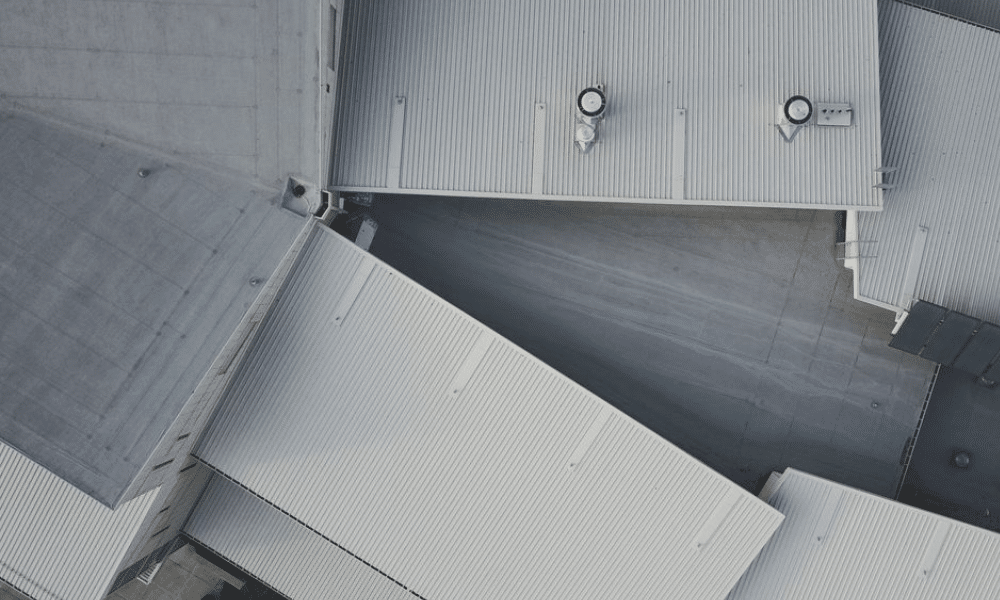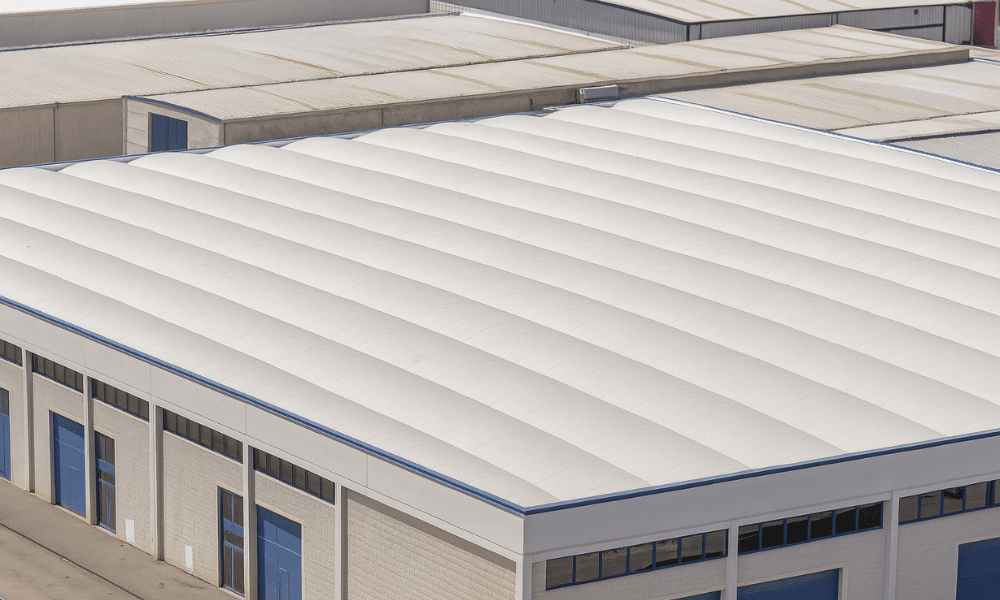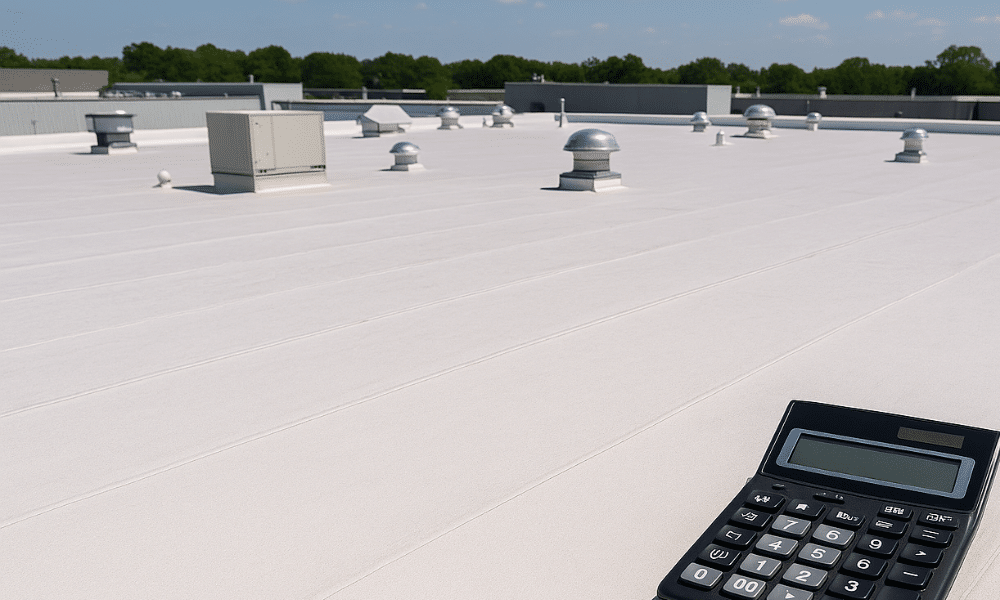
Summary Highlights:
- Flat roofs on agricultural buildings are especially vulnerable to water pooling, membrane punctures, and wind uplift.
- Hail and debris can severely compromise metal panels or TPO membranes commonly used on barns and storage sheds.
- Poor drainage and clogged downspouts worsen storm damage over time.
- Post-storm inspections protect crops, equipment, and livestock housed under flat-roofed ag structures.
How Do Flat Roofs Perform in Stormy Weather?
Flat roofing systems are a common design choice for agricultural buildings—barns, equipment sheds, storage facilities, and even livestock shelters. They're cost-effective, provide usable space, and simplify HVAC and ventilation placement. But when storms strike, these roofs take the brunt of the damage. At WaterTight Roofing, we've worked with farmers and ranchers across Texas who've learned that post-storm roof inspections are more than a best practice—they're essential to keeping your operations running and your assets protected.
What Are the Most Common Storm-Related Issues on Agricultural Flat Roofs?
Ponding Water and Poor Drainage
Flat roofs don't shed water as easily as sloped ones. During a heavy rainstorm, especially if drainage is partially blocked, water can pool on the surface for hours or days. This standing water increases the risk of membrane deterioration, seam separation, and eventual leaks into the building's interior. Agricultural roofs often lack the engineered slope or scupper systems found in commercial city buildings, which makes proactive drainage management crucial.
Wind Uplift and Membrane Tearing
High winds are particularly dangerous for flat roofs, especially on large-span structures like hay storage or dairy facilities. Strong gusts can get under membrane edges or flashing, lifting them and causing rips or total roof blow-offs. In some cases, we've seen entire membrane sections folded back after windstorms—exposing insulation and decking to the elements. Wind uplift can also loosen fasteners on metal panels, compromising the roof's structural integrity.
Hail Damage on TPO and Metal Roofs
Agricultural buildings often use either TPO membrane systems or exposed fastener metal panels. Both can take a beating from hail. TPO systems may appear fine from a distance but suffer soft bruises, punctures, or micro-tears that compromise waterproofing. Metal panels may dent or warp at seams and penetrations, reducing their ability to shed water and increasing corrosion risk if coatings are breached.
Debris Impact from Trees and Equipment
Storms on farms don't just bring rain—they often drop branches, debris, or even parts of nearby equipment. A falling limb or wind-borne debris can puncture a TPO membrane or bend a metal panel enough to open gaps. These small breaches quickly become major problems when left unchecked.
If your agricultural roof has recently weathered a storm—or you want to make sure it's built to withstand the next one—contact WaterTight Roofing at 888-809-9976. As a leading roofing contractor for agricultural buildings in Texas, we provide expert inspections, repairs, and storm-ready solutions tailored to your property's unique structure and use. Let's protect your livelihood from the top down.
What Agricultural Buildings Are Most at Risk?
At WaterTight Roofing, we've seen the greatest storm vulnerability in:
- Grain silos and feed storage buildings
- Barns with aging flat roofing systems
- Farm offices with HVAC units placed on rooftops
- Animal shelters, where moisture buildup can affect health and hygiene
- Equipment storage facilities lacking routine roof maintenance
What Should You Do After a Storm Hits Your Farm?
If a storm recently passed through your area, here's what I recommend:
- Inspect your building from a safe distance. Look for water ponding, membrane bubbles, fallen debris, or loose panels.
- Walk the perimeter and check for loose flashing, torn roofing, or displaced gutters.
- If it's safe, check inside for new leaks, water stains, or odors that could indicate roof failure.
- Avoid climbing onto the roof yourself—soft spots and hidden damage pose fall risks.
Schedule a professional roof inspection within 48–72 hours. At WaterTight Roofing, we use infrared scans, drone mapping, and on-roof assessments to catch issues early.
How Can WaterTight Roofing Help Protect Your Agricultural Roof?
At WaterTight Roofing, we specialize in commercial and agricultural roofing systems and have deep expertise in TPO, PVC, metal, and elastomeric-coated roof types commonly found on farms, barns, and rural infrastructure. When severe weather hits, we know that every hour counts—especially when your operation, livestock, or storage assets are at risk.
That's why we deploy emergency roofing repair crews for farm properties and critical facilities like warehouses, storage sheds, and even emergency roofing repair for retail centers after a storm. Whether you manage crops or customers, we respond quickly to minimize damage and restore protection.
When you call WaterTight Roofing after a storm, here's how we help safeguard your agricultural roof:
- Conduct a comprehensive inspection and detailed documentation to support your insurance claim
- Provide emergency tarping, sealing, or membrane repairs to prevent further water infiltration
- Recommend storm-resistant restoration options such as reinforced coatings or slope enhancements
- Address drainage problems that cause ponding water or gutter overflow
- Extend your roof's lifespan by identifying hidden damage and proactively reinforcing weak points
We understand that downtime on a farm or ranch affects more than just structures—it disrupts productivity, delays harvest, and risks animal welfare. That's why our roofing solutions are designed to be fast, durable, and long-lasting—delivered with the urgency your business deserves.
Is Your Agricultural Roof Storm-Ready?
Whether recovering from a recent storm or preparing for the next one, your flat agricultural roof needs expert attention. At WaterTight Roofing, we understand how storms affect flat roofs on agricultural buildings—from hidden membrane punctures to compromised drainage and insulation.
Don't wait for leaks or structural issues to disrupt your operation. Contact WaterTight Roofing today at 888-809-9976 to schedule your FREE agricultural roof assessment. We'll identify potential damage, recommend the right repairs, and help safeguard your facility with durable, storm-resistant solutions. Your farm, investment, and peace of mind deserve nothing less.
FAQs About Agricultural Roofing
Here are the questions we hear most often from farm and ranch owners needing dependable roofing for their commercial and agricultural properties:
Why Trust WaterTight Roofing
WaterTight Roofing is Texas's go-to expert for commercial and industrial roofing solutions, proudly serving Fort Worth, Austin, and surrounding communities since 2011. With over 20 million square feet of commercial roofing installed, we specialize in flat and low-slope systems, storm damage restoration, insurance loss evaluations, roof replacements, and energy-efficient roof coatings. As trusted partners to property managers, business owners, agricultural operators, and facility directors, we deliver durable results with unmatched integrity.
At WaterTight Roofing, we're not here for one-time fixes—we're here to protect your property and bottom line for the long haul. From inspection to installation, our team is committed to quality, clarity, and client-first service every step of the way.
Blog subscribers get new resources and how-to guides delivered via email.
Your Business Relies On Staying Dry





